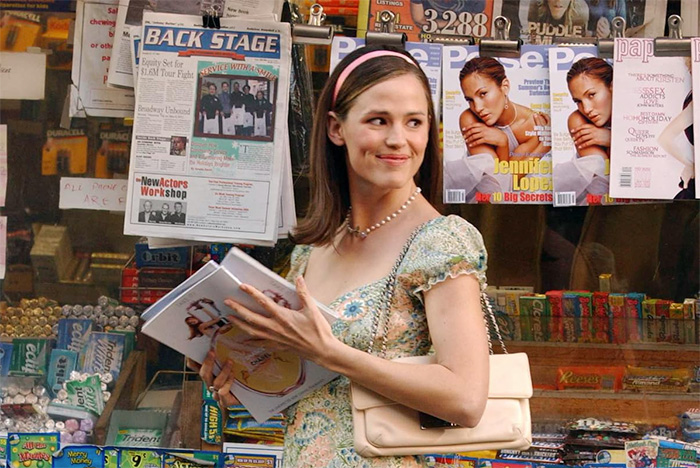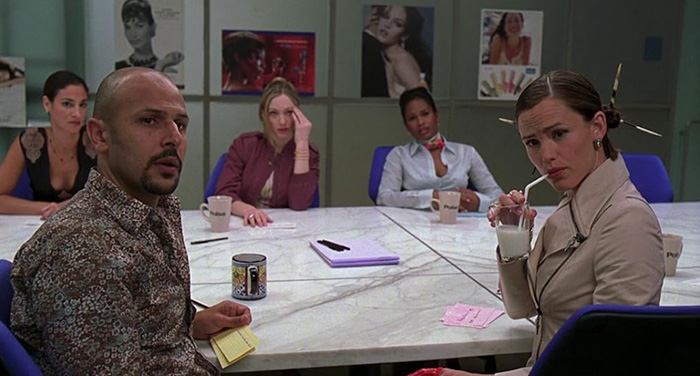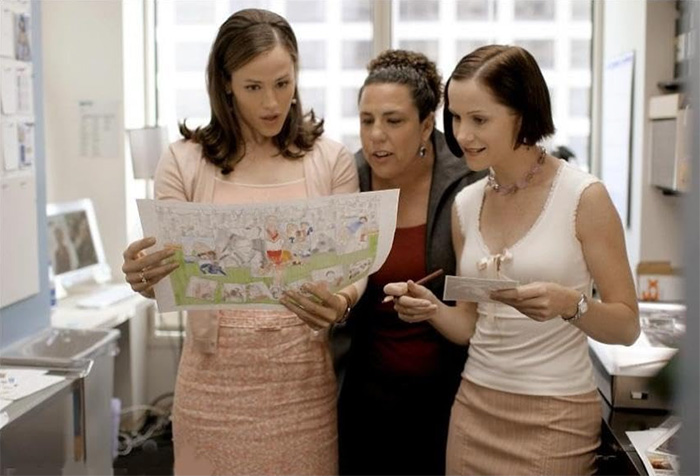Remember what used to be good: On '13 Going on 30' and journalism today
There’s a classic scene in the 2004 chick flick 13 Going on 30 where newly teen-aged Jenna Rink prepares for her birthday party. She’s stuffed tissues under her blouse to give the impression of a full bosom and is right in the middle of adding another layer of blush when her mom barges into the room.
There’s a glint of concern in her all-knowing eyes, causing our protagonist to erupt into an angst-riddled temper tantrum that I know too well. “I don’t wanna look beautiful in my own way. I wanna look like these people. ‘Thirty and flirty and thriving,’” she reads from a spread in Poise magazine. “I wanna be thirty”—just like the models that grace the pages of her favorite glossy.
Watching this for the first time several years after its release, I knew exactly where she was coming from. I knew what it felt like to obsess over magazines: collect every copy of Total Girl and Candy that was in circulation and pore over their pages with a feverish passion. And I knew the dull, distinct ache in the bones that came with realizing that I was too young to want whatever I thought I wanted.
The romantic comedies from the late 90s to the early aughts that I grew up on were highly effective feature film-length advertisements for the industry: from Andie Anderson’s successful social experiment as Composure’s how-to girl to Josie Geller’s undercover journalism in Never Been Kissed. But Jenna was the first character I truly identified with. She was just a girl trapped in a grown woman’s body, navigating the cruelties of the "real world" without losing her childlike wonder–and succeeding in the process.

But after numerous rewatches of this comfort film over the years, I figured it might be best to keep pipe dreams, pipe dreams. I shock people every time I reveal that I actually graduated college with a marketing degree. I was in the school paper, maintained a personal blog on the side. I lived vicariously through everyone who bravely chased after our shared dream. Writing was always in the picture, but I never wanted it to be the end goal, in fear that doing so would dull its sparkle.
Nothing Jenna would have imagined
Yet as fate would have it, despite many attempted diversions, all roads led me here – to this profession and to this piece. And it’s nothing like Jenna would have ever imagined: who would have thought I’d have to grapple with both the impending death of print and takeover of artificial intelligence?
The Philippines remains one of the most dangerous countries in the world for journalists. Local and international publications alike are shutting down and wiping out their entire archives, years’ worth of work left to disappear into the ether. In the remaining newsrooms we have, women continue to suffer from sexualized violence both on the field and in the office.
Clicks and likes have become currency in these conditions; the engagements we acquire become the key measure of impact, rather than the empathy we inspire.
I constantly feel like I need to churn out the most controversial forms of content to maintain relevance. (Did I mention how much it irks me that stories are now being referred to as ‘content’? Searing investigative reporting is often lumped under the same term as 60-second TikTok videos in today’s attention economy.) This means blurring the line between the personal and professional until I have unknowingly surrendered my complete biodata to the internet.

As writers, we are encouraged to milk our lives for conversation starters and distill the gory details of our lives into a pitch. I have yet to learn how to switch off the transcription tool in my head that starts typing as soon as my friend says something of note.
Back when writing was merely a hobby for me, everything felt natural. I would wait for my muse to visit, entertain any ideas she had, and allow her input to shape my own – slowly, intentionally, preferably in a quiet space by an open window and some tasteful choice of music. But now, staying alive and paying the bills hinges heavily on my ability to produce and turn over as many pieces in the shortest possible time frame. On top of that, I need to learn how to market my work properly, carving out time to maintain a TikTok presence or learn SEO best practices because organic traffic feels like a relic of a bygone era.
Jenna faces a dilemma like this in the film, as well, when she realizes that adulthood isn’t all it’s cut out to be. Faced with the dual challenge of redesigning a near-obsolete Poise and realizing that she’s become the kind of monster people write full-blown exposés about, she heads back home to New Jersey to recenter.
Keeping it going
We need to remember what used to be good. If we don't, we won't recognize it even if it hits us between the eyes. - Jenna Rink
Amid news cycles inundated with turmoil and tragedy, pausing can seem like a privilege. But I’ve learned that if we don’t choose a time to slow down and step back, our bodies will choose it for us. Every time I feel a little jaded, I watch her and feel encouraged by this uncanny display of wisdom, from someone whose prior problems were bad yearbook photos and birthday party games.
As soon as she returns with a clearer head, Jenna comes up with an idea that speaks true to her and her readership. Informed by recent interactions with someone who knows her better than anyone else, she envisions a Poise where you can see everyone from your best friend’s sister to the girls on the soccer team. “Real women who are smart and pretty and happy to be who they are,” as she describes them to her team during her iconic pitch meeting.

This is what keeps me afloat today: the opportunity to highlight the stories that matter, to cut through the noise and shed light on what speaks to us as humans. Because even when everything is looking grimmer than anything my imagination could have conjured, the sheer hope of something better than what we have is worth latching on to. Jenna ends her presentation by saying that we need to remember what used to be good because if we don’t, we won’t recognize it even if it hits us between the eyes. While there is some truth to this, it could use a bit more expansion.
That means seeking out people whose narratives are often overlooked or underrepresented, or paying attention to what we pay attention to and how we might have contributed to a world on fire. That means taking on the necessary role of note-taker, timekeeper, and memory hoarder in a political timeline that incentivizes those who forget. That means making sure that while journalism won’t always look as glamorous as it does onscreen, it’ll at the very least ensure that the good we enjoyed is passed down for generations to come.


